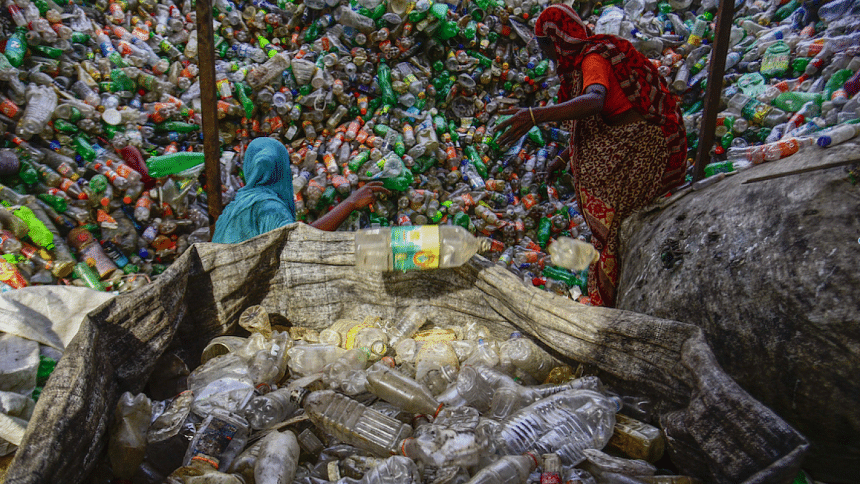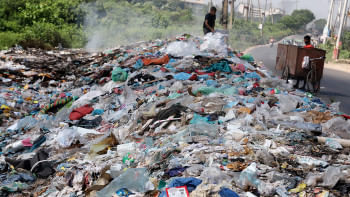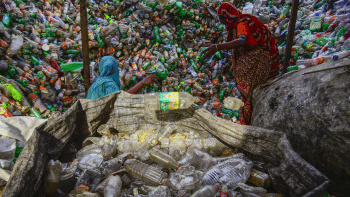Reduce, reuse, recycle… and then what?

There's nothing I despise more than the sight of plastic littering. This disdain stems from seeing plastic items strewn about in water bodies, on walkways, roads, and virtually everywhere else. The prevalence of this issue is often due to the lack of disposal bins or proper waste collection systems. Even when bins are available, most people lack the awareness or the inclination to use them to discard plastic waste, under the misguided belief that their actions have no impact.
A while back, I encountered a video promoting a "zero waste lifestyle." Inspired, I decided to adopt this lifestyle for a week. To my dismay, within just three days, my medium-sized bin was brimming with waste. The stark contrast between my experience and that of the lady in the video, who resided in a developed country, exposed a glaring issue: the lack of sustainable options available to me. She had access to grocery stores offering packaging-free soaps, shampoo, and conditioner dispensers—a luxury I couldn't find in a single mudir dokan or super shops that only had these items in plastic bottles. So there I was, staring at the horror of my plastic consumption, and I realised how far behind we are in building a system that effectively reduces plastic consumption.
Interestingly, Bangladesh pioneered environmental regulation by banning thin polythene and plastic bags in 2002, becoming the first country in the world to enact such a ban. But despite this groundbreaking measure, a 2021 World Bank study revealed that Dhaka alone generates 646 tonnes of waste daily, accounting for 10 percent of the country's total waste. Of this, only 37.2 percent of plastic waste is recycled. The National Action Plan for Sustainable Plastic Management set ambitious goals: to recycle 50 percent of plastics by 2025, phase out targeted single-use plastic by 90 percent by 2026, and reduce plastic waste generation by 30 percent by 2030, from the 2020-21 baseline. While these targets are commendable, their realisation within the set timelines remains uncertain.
Bangladesh is not alone in facing this environmental challenge, however. The OECD report titled "Global Plastics Outlook: Policy Scenarios to 2060" projects a troubling trend: global plastic use is expected to triple from 460 million tonnes in 2019 to 1.32 billion tonnes by 2060, largely driven by economic growth. The Covid pandemic temporarily reduced plastic use due to the downturn in economic activity, with projections for 2060 being two to four percent lower than the pre-pandemic estimates, depending on the recovery's speed. This period also saw many governments implement stricter plastic bans. A personal observation from my 2019 visit to Ha Long Bay, one of the new seven wonders of the world, underscores the pervasive issue of plastic pollution, even in the most pristine environments. Post-pandemic measures have led to a ban on single-use plastics on tourist boats in Ha Long Bay, with the management board reporting a 90 percent reduction in general plastic use on boats, highlighting a successful step towards mitigating plastic pollution in places of natural wonders.
This situation highlights two critical realities. Firstly, human reliance on plastic has become so integral that our day-to-day existence seems inextricably linked to single-use plastics. Secondly, our consumption of plastic far exceeds our capacity to recycle it. According to the World Economic Forum (WEF), an alarming 30 percent of plastic escapes the collection system, ending up unaccounted for and polluting local waterways and oceans. This undermines the comforting belief that the plastic we conscientiously place in recycling bins will be effectively recycled and reused.
A fundamental issue with plastic recycling is its limited lifecycle. Plastic can generally be recycled only once, and the process invariably degrades its quality. This means that recycled plastic is often relegated to lower-grade applications, further complicating the sustainability of its use. The recycling process, therefore, requires a more radical rethinking of our dependency on plastic materials and a concerted effort towards reducing consumption and improving waste management practices.
Contrary to the belief that developed countries' waste management models are inapplicable in developing nations, I believe such a system could yield significant benefits if implemented elsewhere, including Bangladesh. Imagine the potential impact on waste disposal habits and the empowerment of marginalised communities, such as homeless or informal waste collectors (tokais), who could benefit from a formalised system. These individuals currently collect plastic bottles to sell for a small sum; a structured system could transform this into a more sustainable economic activity.
The greatest hurdle in enhancing Bangladesh's recycling capabilities arguably lies in the sorting of waste. Effective separation of plastics, metals, and food scraps could significantly advance recycling efforts. Surprisingly, the solution may not be as complex as it seems. A personal anecdote illustrates this point vividly. Over recent months, I noticed that plastic items mysteriously vanished from our home. Knowing they weren't being discarded with regular trash, I discovered that our house help had been diligently separating plastic waste, storing it in a large rice sack. Once full, she sells the plastic to scrap shops. Though the earnings from this effort are modest, this practice initiated an informal recycling system within our home, significantly reducing our plastic waste.
However, this informal system doesn't fully solve the problem. Much of the collected plastic ends up in areas like Kamrangirchar in Old Dhaka, where it's melted into pellets. While some of these pellets are sold to companies, others are simply discarded, underscoring the inefficiencies in the recycling process.
The reality is that recycling alone cannot combat the environmental impact of plastic waste. To make a meaningful difference, we must dramatically reduce our plastic consumption. The waste management hierarchy has evolved to include five Rs: refuse, reduce, reuse, repurpose, and recycle, with "refuse" being particularly critical for Bangladesh. Despite innovations like the Sonali Bag, a biodegradable alternative to plastic bags made from jute, economic barriers limit their widespread adoption. The Sonali Bag's relatively high cost (Tk 8-10 apiece) compared to polythene (Tk 3-5 per kg) underscores the need for substantial investment to scale up eco-friendly alternatives.
One remarkable initiative in recycling innovation is the UNDP's Innovation for Circulatory of Plastic Waste project, part of their Urban Livelihood Project in Jelepara. This project saw a collaboration with EcoBloc, a company in Bangladesh, to create plastic bricks from materials deemed non-recyclable, such as single-use plastics, wrappers, melamine, and fabric wastes. Impressively, these bricks are tested to be twice as strong as traditional clay-made blocks, with the added benefit of not requiring cement for their construction—a significant advantage considering cement's substantial carbon footprint.
This innovative approach offers a promising solution to tackle the mounting waste problem. However, it faces a familiar challenge: sustainability post-external funding. The reliance on external funds to support such pioneering efforts points to a broader issue in scaling eco-friendly technologies. Without continued financial backing, these innovations remain at risk of fading away, underscoring the need for systemic support and a sustainable business model to ensure their longevity and impact.
Ultimately, the effectiveness of recycling and innovative waste management solutions hinges on our collective willingness to reduce plastic demand. The existence of plastics and their environmental impact are directly tied to consumer behaviour. By focusing on the refusal of plastics, alongside adopting and supporting sustainable innovations, we can significantly mitigate the environmental challenges posed by plastic waste. The journey towards a greener future starts with reevaluating our reliance on plastics and embracing alternatives that foster both environmental sustainability and economic viability.
Nazifa Raidah is a member of the editorial team at The Daily Star. Reach her at [email protected]
Views expressed in this article are the author's own.
Follow The Daily Star Opinion on Facebook for the latest opinions, commentaries and analyses by experts and professionals. To contribute your article or letter to The Daily Star Opinion, see our guidelines for submission.


 For all latest news, follow The Daily Star's Google News channel.
For all latest news, follow The Daily Star's Google News channel. 










Comments